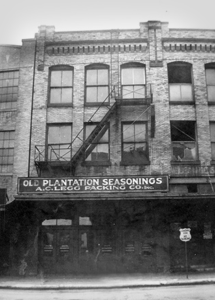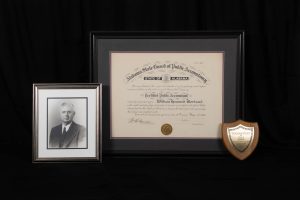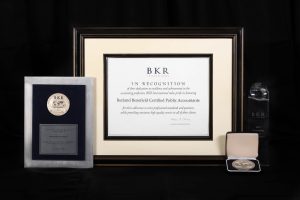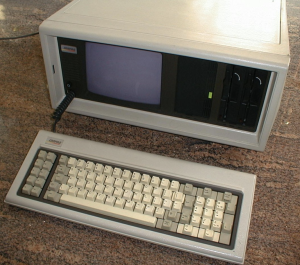The year 1922 was notable for a number of events in the world, including the formation of the USSR, the first successful insulin treatment, and the first Wimbledon Championship. At the time, Warren G. Harding occupied the Oval Office as the 29th president, the Lincoln Memorial was dedicated and opened to the public, and an improbable “Team of Destiny” from Princeton won the NCAA football championship.
Meanwhile, in another corner of the world, William Howard Borland, Sr. quietly turned a key in the City Federal Building in downtown Birmingham, and opened the door to what would become – 100 years later – one of the oldest accounting firms in Alabama: Borland Benefield.
 It was a quiet beginning, but slowly and surely, Mr. Borland grew the humble practice. At the time, the balance of the firm’s clientele included personal taxes and commercial accounts in the industrial and manufacturing sector, reflecting the business landscape of Birmingham. One of those early clients was W.J. Bullock, a company whose relationship they would enjoy for well over 50 years. The firm also handled A.C. Legg Packing Company, a spice and seasoning company founded in 1923.
It was a quiet beginning, but slowly and surely, Mr. Borland grew the humble practice. At the time, the balance of the firm’s clientele included personal taxes and commercial accounts in the industrial and manufacturing sector, reflecting the business landscape of Birmingham. One of those early clients was W.J. Bullock, a company whose relationship they would enjoy for well over 50 years. The firm also handled A.C. Legg Packing Company, a spice and seasoning company founded in 1923.
Another one of the firm’s more prominent clients was Britling Cafeterias, a regional cafeteria chain based in Birmingham.

One location of Britling Cafeterias at 2016 3rd Avenue North, circa 1920.
It’s important to note that at the time professionals, such as accountants and lawyers, were not allowed to advertise. In fact, accounting firms could have their business licenses suspended if they were caught poaching clients from another firm.
Thus, networking and the acquisition of competitors became one of the primary ways for many firms to grow. Borland Benefield would have a history of both, but Mr. Borland was in no position to make acquisitions in the early years of the company.
 In order to spread the reputation of the firm, Howard Borland became an early leader in the Alabama Society of CPAs. The society was founded in 1919 with the mission of expanding Alabama’s accounting profession while protecting members’ interests. Today, the Society claims more than 6,000 members. Borland leveraged his membership in the Society to grow his business and expand the firm’s reputation. In 1948, Borland became president of the organization, solidifying his status as a prominent leader in the accounting profession.
In order to spread the reputation of the firm, Howard Borland became an early leader in the Alabama Society of CPAs. The society was founded in 1919 with the mission of expanding Alabama’s accounting profession while protecting members’ interests. Today, the Society claims more than 6,000 members. Borland leveraged his membership in the Society to grow his business and expand the firm’s reputation. In 1948, Borland became president of the organization, solidifying his status as a prominent leader in the accounting profession.
As the firm grew, so did the staff. In 1950, Alice Helms joined as secretary and administrative assistant. Little did anyone know that she would become a consistent thread in the fabric of the company, working there for 58 years until her retirement in 2008. She would bear witness to the growth of the firm and be the impromptu keeper of the firm’s history.
“Mr. Borland was a sweet, sweet person,” Ms. Helms reflected, “but he wanted everything done right. So we would learn to take our time and do the work right. He was never angry, but he had a very high standard.” Alice recalled that the firm handled the monthly depreciation schedules for Britling Cafeteria, which required ten copies created with carbon on onion skin paper. “I learned to type flawlessly because Mr. Borland would not allow an erasure.”
As the firm continued its growth, Mr. Borland kept one eye on the future and made a succession plan forming a partnership with his son, William Howard Borland, Jr., in 1951. For the next 20 years, the firm operated as William Howard Borland & Son.
The 1970s
 The 1970’s marked a decade of growth for the firm. On January 1, 1971, Joseph T. Benefield entered into the partnership, and the firm took on the name of Borland, Borland, and Benefield.
The 1970’s marked a decade of growth for the firm. On January 1, 1971, Joseph T. Benefield entered into the partnership, and the firm took on the name of Borland, Borland, and Benefield.
A little over a year later, the firm was saddened by the passing of Mr. Borland, Sr., leaving the firm in the care of his son and Joseph Benefield. The business wasn’t the same without his father, and Howard Borland, Jr., chose to withdraw from the firm to pursue his interest in devotional studies.
Joseph Benefield still saw the potential for growth in the firm and, in 1972, he crafted a partnership with David C. Crawford, morphing the firm’s name into Borland, Benefield & Crawford. To mark the change, the firm moved to Office Park in Mountain Brook. Office Park was one of the first planned office park developments in the United States. A few years later, the partners and members in the firm bought an office building at 2545 Highland Avenue.

At the corner of Highland and Niazuma, the firm’s home from 1977 to 1998.
As a testament to the firm’s progressive point of view, Alice Helms was one of seven investors in the purchase of the building.
The Library Lounge
During that time, many of Birmingham’s leading businessmen would gather at a local lounge to unwind with a drink and cigars and share news on the business climate in the city.
Sheldon Webster was one of the many businessmen known to frequent the lounge, and he struck up a friendship with David Crawford that would be a keystone for the next 50 years of growth for the company. On March 1, 1977, the firm merged with Webster & Associates and became Borland, Benefield, Crawford & Webster.
“I represented one-third of the business of Benefield and Crawford,” recalled Webster, “so the partnership was a perfect match.”
Sheldon Webster might have made his living as a CPA, but didn’t fit the mold of a typical CPA. He lived a very full life as a writer, mountain climber, adventurer, sailor, and soldier. Upon joining, Webster brought his sense of adventure to the firm as he set about modernizing the office. “The team at the time were all individuals,” he recalled with a chuckle. “It wasn’t an accounting firm. We were a bunch of accountants sitting in the same office.” Within a year of joining the team, Mr. Webster organized an audit department, and a tax department, helping to bring the firm up to the standards of the time.

Later that year, the firm welcomed William J. Jeffares as a shareholder. As they brought the decade to a close, they boasted a roster of prestigious clients, including the Mountain Brook Country Club, the Birmingham Museum of Art, and Vulcan Metal Products, to name a few.
Continued Growth and International Influence
The 80’s ushered in the remarkable new technology of the fax machine, and it was clear that even then, electronic communication was beginning to make the world a smaller place. Webster felt the firm needed an international connection to help the company find its place in the broader world.
Webster found that connection a few years later when the firm established an affiliation with BKR International, a worldwide association of independent accounting firms. Borland, Benefield, Crawford & Webster would represent Alabama.
At the time, BKR International claimed a membership of more than 130 member offices around the world. Their affiliation with BKR would empower the firm with international reach and prestige and expand their services into securities trades and other arenas.
The other partners expressed reservations about joining BKR International. “That costs money,” they said, to which Mr. Webster responded, “How are you going to make any money if you don’t spend any?”
Building with BKR
 Mr. Webster enthusiastically pursued the firm’s relationship with BKR, eventually becoming membership director. He continued working his way up through the organization until he became chairman of BKR International in 2003. This affiliation took him around the world, and over time he was able to travel to more than 150 countries.
Mr. Webster enthusiastically pursued the firm’s relationship with BKR, eventually becoming membership director. He continued working his way up through the organization until he became chairman of BKR International in 2003. This affiliation took him around the world, and over time he was able to travel to more than 150 countries.
The early 80’s also marked a decade of increased expansion starting in 1983 when Allen D. Collins became a shareholder and merged his practice into Borland, Benefield, Crawford, Webster & Jeffares. One year later, the firm opened an office in Florence, Alabama.
A Sudden Death
When business is good, it’s easy to forget how suddenly and unexpectedly life can change. Such was the case when managing director William Jeffares unexpectedly passed away in 1985.
In light of his passing, the firm returned to operating under the name Borland, Benefield, Crawford & Webster, P.C. Later that year, after more than 35 years as a shareholder, Mr. Benefield retired.
Embracing Technology
Unlike many firms, Borland Benefield was eager to adapt to new technologies. In the early 90’s, the firm was one of the first to implement the use of a mobile computer. “The unit was packed for travel in a box about the size of a suitcase,” recalled John Wilson, currently president and managing director of the firm. “It had a portable keyboard and a small green screen that ran on DOS coding.”

The early days of technology.
“In those days we carried satchels of files to client’s offices. Some even had a trunk depending on the size of the client. We even had a company van to carry the documents,” recalled Wilson.
Even then, the firm saw technology as the wave of the future and tried to have an impact on it. For a brief period in the early 90’s, Sheldon Webster led the charge of Borland Benefield Systems, a software company that was developing an early version of bookkeeping software. The tech space was filling in fast at that time, and BB Systems yielded to software giants like Intuit, who developed such products as MacInTax and TurboTax for Windows.
In 1993, the firm merged with Michael L. Johnson, CPA, and in 1998, Jeffery D. Chandler became a shareholder. To accommodate the growth, the firm moved to Southbridge Parkway location and shortened its name to Borland Benefield.
Y2K
The year 2000 loomed as a doomsday to many businesses in the financial sector. What was known as The Millenium Bug caused international panic as many computer forms contained dates that used two instead of four numbers to represent the year. Various forms of Y2K hysteria ensued, but the firm kept a level head, stayed in close contact with its software vendors, and took extra measures to ensure their records would be safe.

A sample of some of the hysteria surrounding Y2K.
As the business landscape in Birmingham moved away from manufacturing, so too did the profile of the firm’s accounts. In the year 2000, the Borland Benefield Nonprofit Group was created to service the needs of Alabama nonprofits, associations, and benevolent organizations.
Since then, the firm has served notable nonprofits throughout the state, including the Better Business Bureau of Central and South Alabama and Hand in Paw.
In 2003, the firm would lose the last of its namesakes with the passing of Mr. Benefield. “He was always the gentleman, always well-dressed. He would never speak ill of anyone,” Alice recalled.
In that same year, Mr. Chandler was named president and managing director, John M. Wilson became a shareholder, and Sheldon Webster accepted the invitation to serve as the worldwide chair of BKR. Over the next ten years, the growth was more internal as the firm promoted key members of the team. In 2005, Dena Davis became a shareholder and assumed charge of the Florence office. In 2006, Mr. Crawford retired after more than 40 years of service to the profession and Charles Polmatier became a shareholder. Additionally, in 2007, the firm brought on Dede Hutcheson as Chief Operating Officer.
2008 marked the second notable downturn in the economy with the Great Recession. At this point, the firm’s client mix was leaning toward service-based businesses, nonprofit auditing, and government work. The firm saw many of its clientele suffering through the downturn, so they adjusted pricing and worked with clients to help them through their challenges, living up to their core value of partnering with clients.
During the 2008 financial crisis, the firm once again embraced technology and became completely paperless, migrating to a cloud-based storage system.
In 2009, the firm moved its offices to 2101 Highland Avenue, where they would stay for ten years until moving to their current location.
In 2011, Mr. Webster decided it was time to pursue writing and traveling full-time; he retired after 33 years with Borland Benefield.
Fueling the Next Merger
A few years later, a chance encounter would lead to another fortuitous merger.
Lloyd Shelton of the firm Lovoy, Summerville & Shelton was pumping gas at a station in Mountain Brook when he bumped into John Wilson, executive vice president at Borland Benefield. They knew each other through their work at the Mountain Brook Chamber of Commerce. After the usual small talk, they agreed to catch up over coffee which led to the eventual merger of the two firms in 2017, effectively doubling the size of Borland Benefield and adding three new shareholders – Michelle Granberry, Jeff O’Neal and Lloyd Shelton – with the stroke of a pen. It also added an office in Auburn as part of the deal, increasing the geographic footprint of the company. In 2019, the firm moved to its present location in the Synovus Bank building on Shades Creek Parkway. In 2020, John Wilson was named president and managing director.
As Borland Benefield enters its 100th year, the leaders reflect and look forward. “There are not many companies that have been around for more than 100 years,” Wilson noted. “We are standing on the shoulders of those who started this company, and our hope is that 100 years from now, another Borland Benefield employee will be sharing how they are proud to be part of a company that is 200 years old. Hopefully, they will look back on what a good job we did in 2022 to keep it going.”
Sheldon Webster, who was so instrumental in the firm’s growth in the 70’s, summed it up by saying, “From the day we went to work, it was not about money. It was about helping other people, being successful, and having a good life.”
It’s fair to say they have succeeded at all three.

